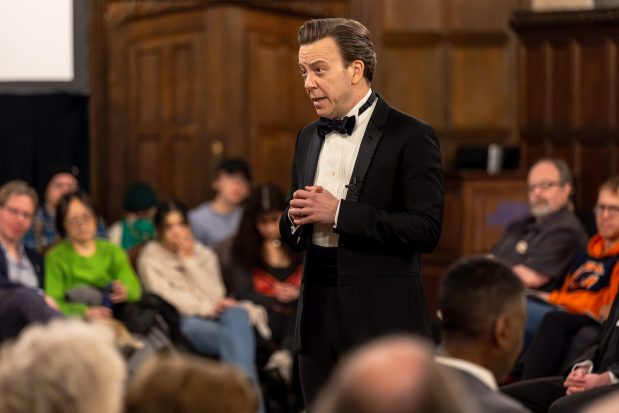On Feb. 18, 1965, the famed Cambridge Union at Britain’s University of Cambridge held a debate between James Baldwin, the illustrious American author, orator and civil rights activist, and William F. Buckley, the suave conservative intellectual and founding editor of the National Review.
The debate, which commanded enormous attention on both sides of the Atlantic, was broadcast live on the BBC that evening and later on U.S. networks. The moment 60 years ago was tumultuous. The Voting Rights Act of 1965 had not yet been signed into law and, just three days after the debate, Malcolm X would be assassinated.
The proposition? “This house believes that the American dream is at the expense of the American Negro.”
This weekend, in the immediate wake of a sharp conservative turn in United States governance, a Brooklyn-based company called the American Vicarious opened a restaging of that fascinating debate, both of its moment and timeless, directed by artistic director Christopher McElroen and in producing partnership with TimeLine Theatre and DePaul University. DePaul’s historic Cortelyou Commons in Lincoln Park was chosen for its approximate resemblance to the home of the Cambridge Union.
McElroen’s “Debate: Baldwin vs. Buckley” is on a long U.S./U.K. tour with these two actors. The piece has already been performed in the debate’s original location. I should note that the debate transcript is in the public domain, a state that both Baldwin and Buckley (who had commonalities as well as differences) fought in court but thankfully lost. That made this show possible, as well as a previous piece from New York’s Elevator Repair Service.
The audience sits in a rectangle listening to two actors, Teagle F. Bougere (a superb performer familiar here from his past work at Court Theatre) and Eric T. Miller, a very detailed actor, reenact the debate from its transcripts. Baldwin spoke for about 24 minutes and Buckley about 29. Unusually for Cambridge, there were no rebuttals. But as was customary, two undergraduates (well played at the performance I saw by undergraduate theater students Jack Baust and Alex Perez), also spoke briefly for and against the motion.
In essence, Baldwin made arguments that in more contemporary parlance would typically be expressed as systemic racism and structural inequity having fatally compromising any growth possibility from U.S. capitalism, for which a phrase like “American Dream” is merely a marketing device.
“The harbors and the ports and the railroads of the country, the economy, especially of the Southern states, could not conceivably be what it has become if they had not had — and do not still have, indeed, and for so long, so many generations — cheap labor,” Baldwin said. “I am stating very seriously — and it is not an overstatement — that I picked the cotton, and I carried it to market, and I built the railroads under someone else’s whip for nothing — for nothing.”
Buckley told the British audience that the average income of American Blacks exceeded that of Britains and previewed many contemporary conservative arguments, saying of Black Americans:
“Their best chances are in a mobile society. And the most mobile society in the world today, my friends, is the United States of America … and it is precisely that mobility which will give opportunities to the negroes which they must be encouraged to take. But they must not, in the course of their ordeal, be encouraged to adopt the kind of cynicism, the kind of despair, the kind of iconoclasm that is urged upon them by Mr. Baldwin in his recent works.”
Buckley scholars have noted that in this debate, a man who had previously sided with Southern segregationists appeared to be changing his mind; at one point in the debate, he said he agreed with the Voting Rights Act. Whether you see that as disingenuous will depend on what you think of Buckley.
But for most contemporary viewers, at this moment, it will be striking how much these arguments remain in the public discourse. One could see that as a sad indication of American stasis when it comes to race or as an inevitable, even a healthy, ongoing debate in a mature capitalist democracy.
This show mostly follows the edited BBC recording although, in a post-show discussion Saturday, McElroen noted some small changes for theatrical effect and Miller said that he had “animated” Buckley far more than was actually the case in a debate where he tended to “drone on,” in Miller’s parlance. Miller might also worry a little less about Buckley’s accent in service of clarity.
Baldwin, a far superior speaker and at the peak of his fame, wiped the floor with Buckley at the time, winning the motion by 544-164 and gaining a standing ovation from the Cambridge students the likes of which BBC host Norman St John-Stevas (both a Cambridge graduate and a member of Parliament at the time) said he had never seen. True last weekend, too. Perhaps unsurprising in Lincoln Park, if anyone had anything good to say about any of Buckley’s remarks, they kept them to themselves. But many people spoke animatedly about how Buckley’s issues with America remained unresolved.
I see many shows and this truly was an atypically engaged audience (Cook County Board President Toni Preckwinkle was in the front row), positively bursting at the seams to have its own say.
I’ll note two other things. One is that the theatrical genre of simple, non-fictional re-creation is a compelling one and under-explored still. The second is that the decorous nature of the debate now stands in contrast to what we see at school boards and the like on YouTube. And that is anything but progress.
Chris Jones is a Tribune critic.
cjones5@chicagotribune.com
Review: “Debate: Buckley vs. Baldwin” (3.5 stars)
When: Through March 3
Where: Timeline Theatre at DePaul University’s Cortelyou Commons, 2324 N. Fremont St.
Running time: 1 hour, 30 minutes
Tickets: $67-80 at 773-281-8463 and timelinetheatre.com
Sign up for the Theater Loop newsletter: Our weekly newsletter has the latest news and reviews from America’s hottest theater city. Theater critic Chris Jones will share a behind-the-curtain look at what you need to know.




